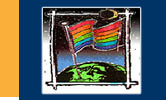
 |
 |
||
Saskatchewan Resources for Sexual Diversity
Memoirs — Peter MillardOr Words to That Effect
In 1973 he joined Saskatoon’s burgeoning gay liberation movement and quickly became an organizer and spokesperson in most of the province’s early battles to advance equal rights for gays and lesbians. He held leadership roles in the Gay Community Centre of Saskatoon, the Committee to Defend Doug Wilson, and the Coalition for Human Equality. On campus he organized a Gay Academic Union in 1975 and became the mentor/protector of two generations of lesbian and gay students. In 1991 he taught the University’s first gay studies course, an examination of social attitudes towards homosexuality in literature. In 1994 the University established the Peter Millard scholarship, Canada’s first university-administered scholarship for research in gay and lesbian studies. After his academic retirement in 1992 one of Millard’s chief pursuits was the writing of a personal memoir with the working title Or Words to That Effect. After his death the completed manuscript was added to the Peter Millard Papers at the University of Saskatchewan Archives. The memoir covers many aspects of Millard’s rich and wide-ranging life, including his student and academic careers and his dedication to the visual arts in both England and Saskatoon. He writes at length of his emotional life as a gay man and of his many experiences in gay activism. Saskatchewan
Resources for Sexual and Gender Diversity is pleased to host three short excerpts which we have
titled: Before Gay LiberationIt was to this organization [the Saskatoon Gay Community Centre] that I turned, in about 1973, at a crucial point in my life. I had, to some extent, taken part in Saskatoon's pre-revolutionary gay life, in the sixties, such as it was. There was a particular pub where you could usually find a gay man or two, mingling discreetly with the straight clientele. There was also the apartment of an older gay man, a pharmacist, who kept a sort of open house for his gay friends, and where newcomers were welcome. His name was Bud, he was kind, genial, and was seldom without a glass of rye whiskey in his hand. I attended occasionally, very much in two minds, because I still found it difficult to face the fact of my homosexuality, and because I found the atmosphere of the gatherings distasteful. We were very much a subculture, forced into irony and self-mockery, and with our own language. Each man was given a woman's name, and everyone was expected, in the safety of the apartment, to perform in a pantomime of exaggerated femininity. As soon as you left the apartment, you immediately dropped the mannerisms and the girl's names, and took up, once again, the role of a "normal," heterosexual man. As far as I was concerned, neither situation was genuine: I was no more a woman/man than I was a heterosexual; both were fakes. Each mode was a prison. For a long time, like so many older, closeted gays, I was made uneasy by the actions of the gay liberationists. The fear was twofold: first, that their actions would make the public more aware of homosexuality thus increasing the danger of being exposed, second, that they would prompt an unleashing of heterosexual hatred against us. Although times were more tolerant, homosexuals like me still depended on invisibility and people's ignorance; this Gay Liberation rocking of the boat was alarming. At the same time, I was becoming more and more ashamed of standing on the sidelines while others were in the forefront of battle. There was even a faint sense of being abandoned as I watched the euphoric young revolutionaries caught up in a surely noble struggle from which I was excluded. They seemed to be having a wonderful time. — Peter Millard Papers (University of Saskatchewan Archives. P.T. Millard Fonds. MG 47) |
|||
“It was an extraordinary feeling. I had broken cover, and was standing in the brightly lit open. There was fear, but it was overwhelmed by a surge of euphoria. No more hiding, no more lies, no more deception; there was no going back now.” |
|||